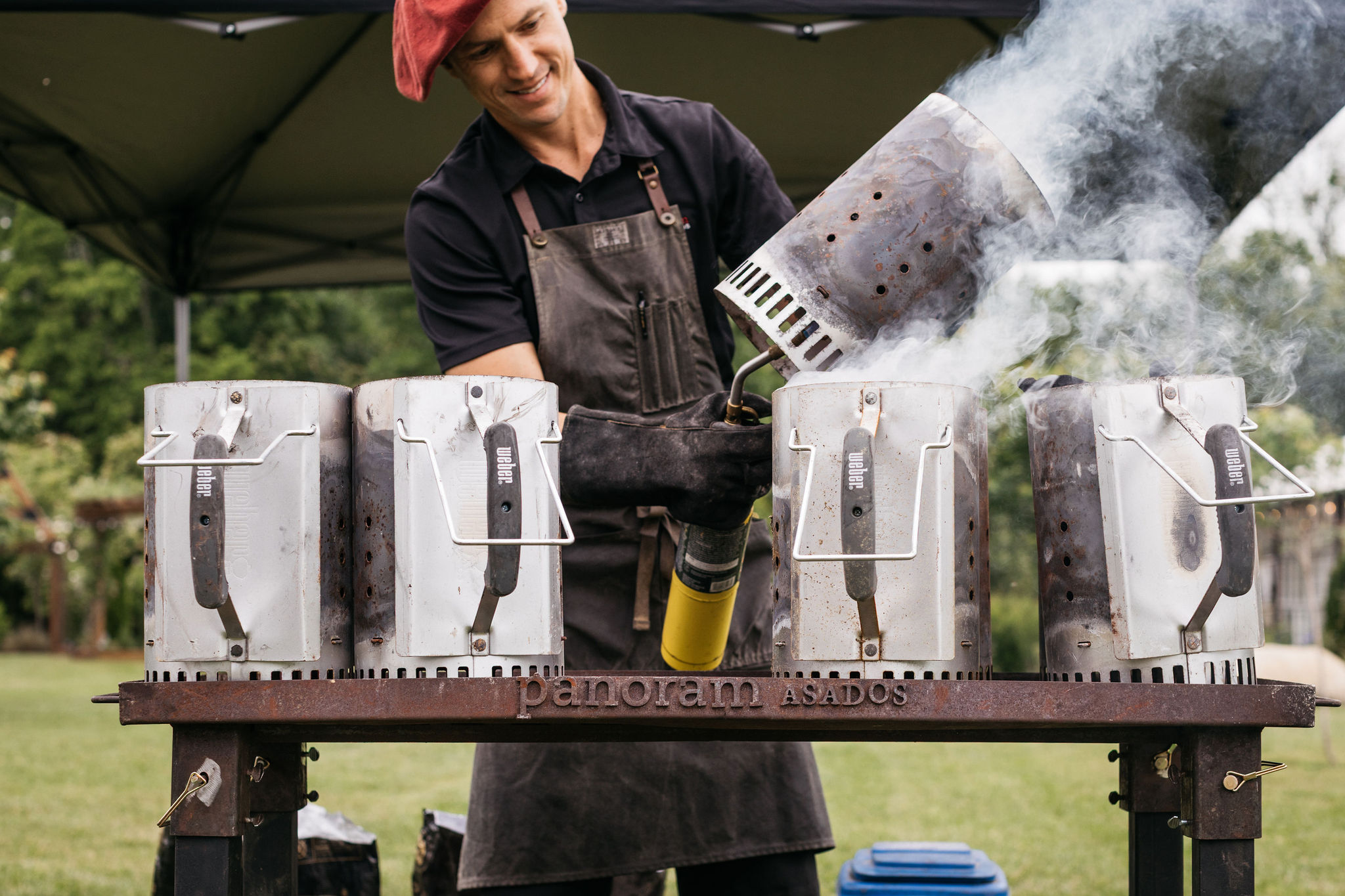
Asado as a Verb: a Tense in Time, a Way of Life
"It was like Anthony Bourdain was going to pop out."
Food as a verb thanks
for sponsoring this series

The fires were first lit years ago.
It is Sunday morning in Salta, Argentina, near the foothills of the Andes Mountains, three decades ago.
Through the open windows, there is the smell of wood smoke, faint at first. There is birdsong, a woman humming to folk music in the kitchen, boiling potatoes. Her husband is outside, salting meats and sipping the day's first birra near the mud oven which contracts and expands, as if breathing. Upstairs, the rustling of a teenager waking.
His name is Mariano Cebrián.
It is the morning of his family's asado.
He helps his father light the fires, chopping up old produce boxes for kindling. The first neighbors stroll up, carrying fruit salad, red wine; uncles, aunts, cousins arrive, more birras are popped, early conversations - football and politics - are easy, soon to grow animated and expansive.
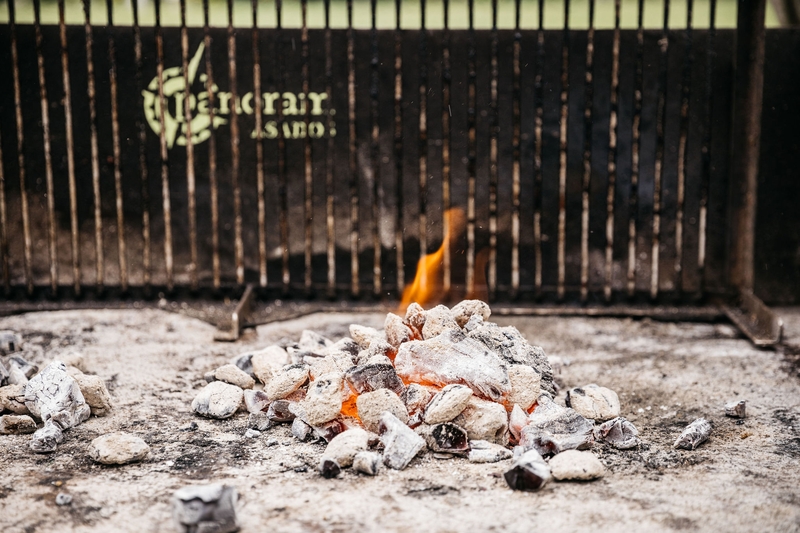
One hour goes by, then two. No one rushes. The long table is then set with wooden plates as the courses arrive: choripan, chicken, then sweet breads, skirt steak, short ribs. The beer turns to wine, early afternoon to evening, the sobremesa - the contentment, the ease - going on for hours.
Young Mariano watches his father preside over it all, hugging, telling stories, attention generously spread wide but also focused, like all good hosts.
Bodies relax. This is asado.
Asado is both a way of cooking - meat prepared over fire - and an experience. For Argentinians, it is also tradition: the long gathering around a shared table.
Years later, Mariano will always remember these moments. No matter where he goes in the world - Georgia College & State University, the Hamptons, Chattanooga - the asado comes with him. The heart won't ever forget.
Camping with friends, he'll light the fire, cooking and preparing the food.
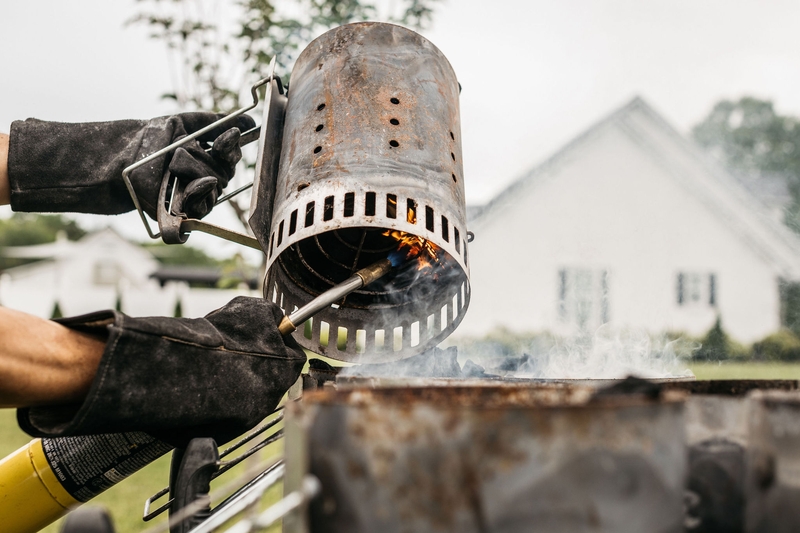
Moving to Chattanooga, he builds grills and ovens in his backyard.
Falling in love with Angelina - they met in college - he invites her back to Argentina, for her first asado.
There, she saw the long table, felt the hours of ease.
"I felt like I was in a movie," she said. "It was like Anthony Bourdain was going to pop out."
It is asado.
"Asado is a feeling. An experience," said Mariano. "Time for us to slow down and have time for each other."
"It is like a fairy tale."
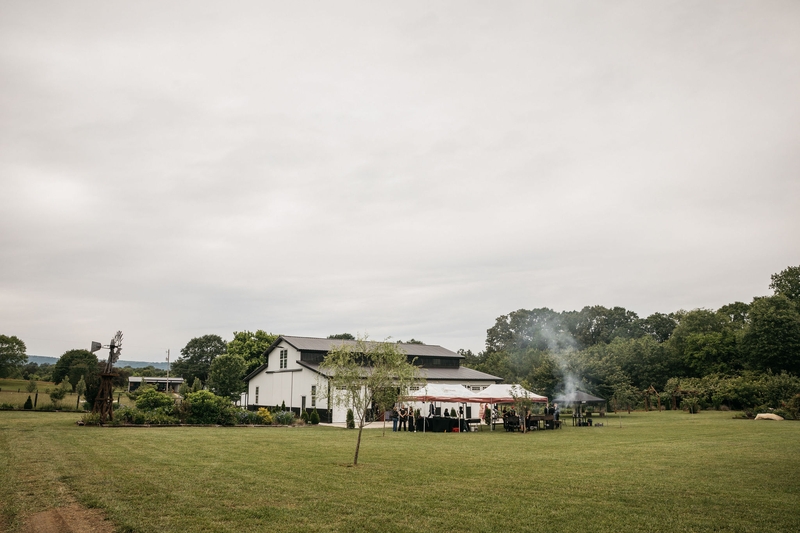
In 2017, Mariano and Angelina created Panoram Asados, a catering company that recreates the asado experience.
Long tables. Hours together. Multiple courses, centered around meat and vegetables cooked over open fires.
"It is slow and we take our time. Eating, little by little," he said. "That slowing down? When you are at a table with food, you engage more, you forget about time."
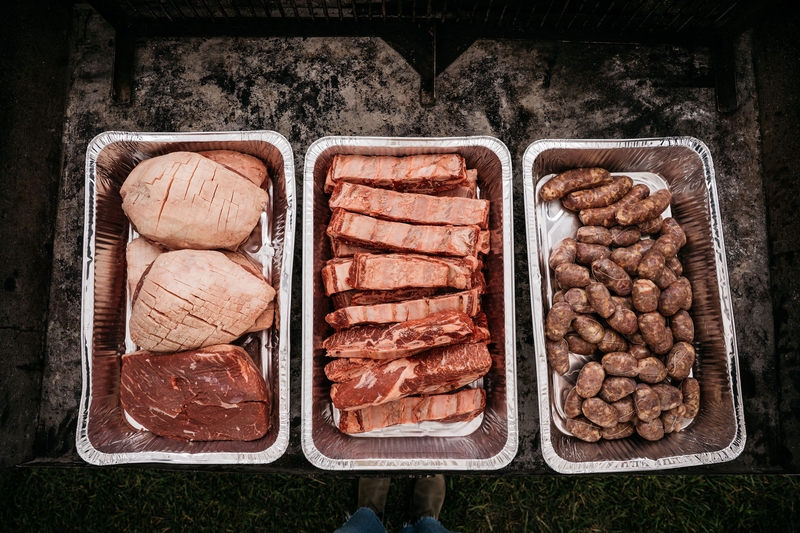
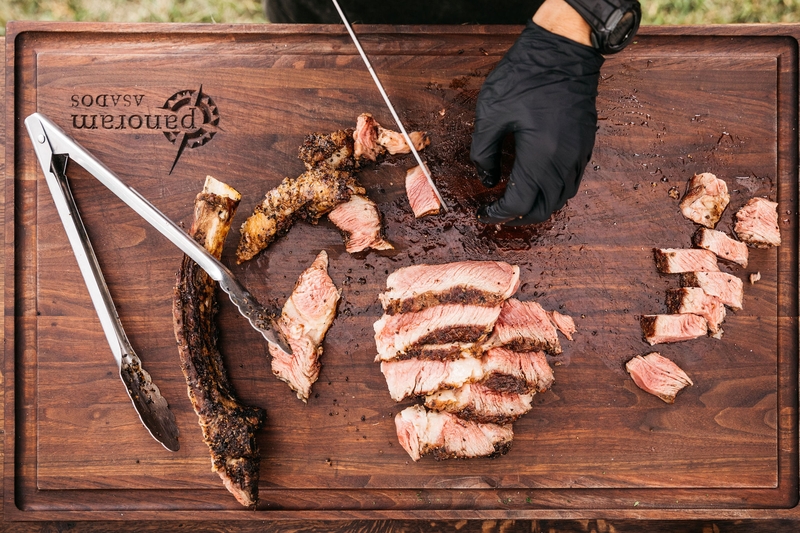
Yet, calling Panoram Asados a catering company is a bit like calling Circe de Soleil a circus.
Yes, they cater.
But the experience is far more than that.
"We build an Argentine restaurant in your backyard," said Angelina.
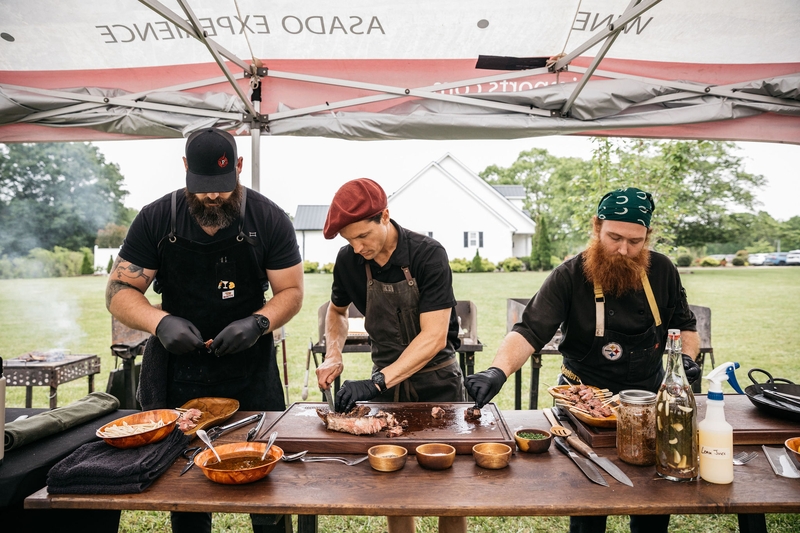
For families and friends, parties and weddings and events, Mariano and Angelina recreate the asado experience: grills forged by hand and open fires, natural lump charcoal, long tables holding multiple courses of meat and vegetables, served at an even pace to encourage rest, connection and communion.
Their menu is vast, yet centered around one truth: everything in its right place. Food cooked over fire, served at an even pace, stretching out the evening to make room for all the things we crave: the sharing of food and ourselves around a table.
"What we do is try to get people to experience food and culture and truly slow down," he said.
"The asado is something that will create memories beyond the food."
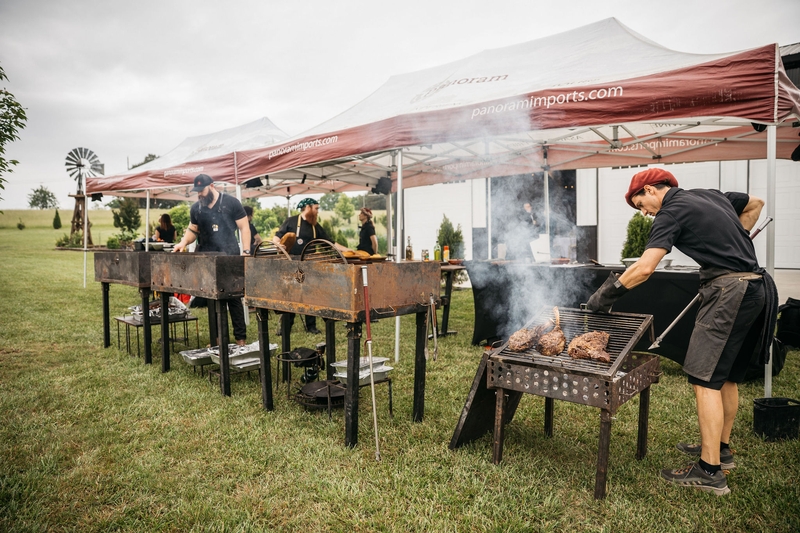
Some 20 years ago, Mariano left Argentina for Georgia College & State University; he played college tennis, with summers coaching in the Hamptons. An MBA followed, then he and Angelina moved to Chattanooga, traveling back to the Hamptons every summer.
"Chattanooga was the closest to Salta that I'd ever seen," he said. "In terms of terrain and mountains and people and sense of community. We both fell in love with it."
He had been informally recreating asados for friends and families for years here. Then, someone said: we'll pay you to do this.
To launch Panoram Asados, Angelina - it felt like a movie - left a career in corporate marketing to partner with Mariano. She calls it "experiential dining."
Today, they spend summers offering asados in the Hamptons, then back to Chattanooga for events in the fall-winter-spring.
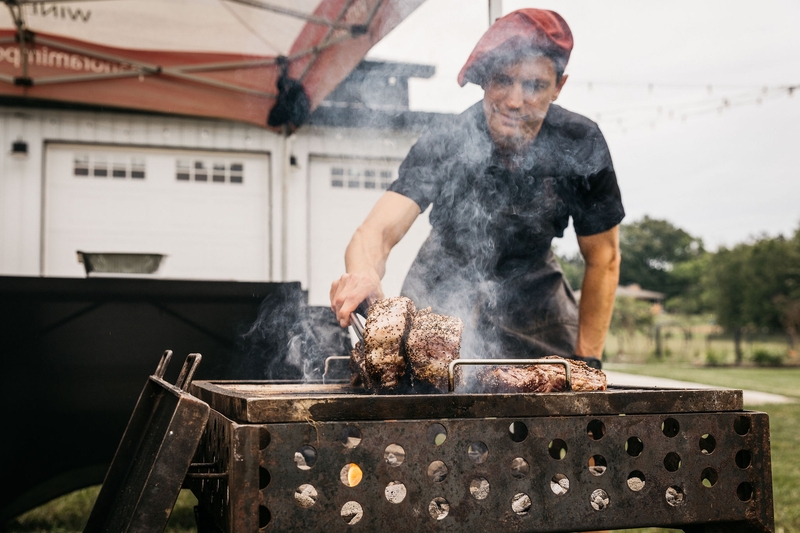
Why is it often hard to find that asado ease? In our treadmill/busy culture, it often feels out-of-reach, a mirage we can't quite make real.
"Here, it's almost like people rely on a good buzz and for 'Sweet Caroline' to come on to give themselves permission to loosen up and relax," Angelina said, smiling.
So, Panoram Asados offers a taste of a genuine asado.
"It's dinner and a show," she said. "We're doing all open fire cooking in front of you."
For other members of the team, it was love at first sight.
"I came to one of these events," said Stewart Howorth.
By the end of the night, he'd walked up to Mariano, hand outstretched, with one question:
"How can I get involved?"
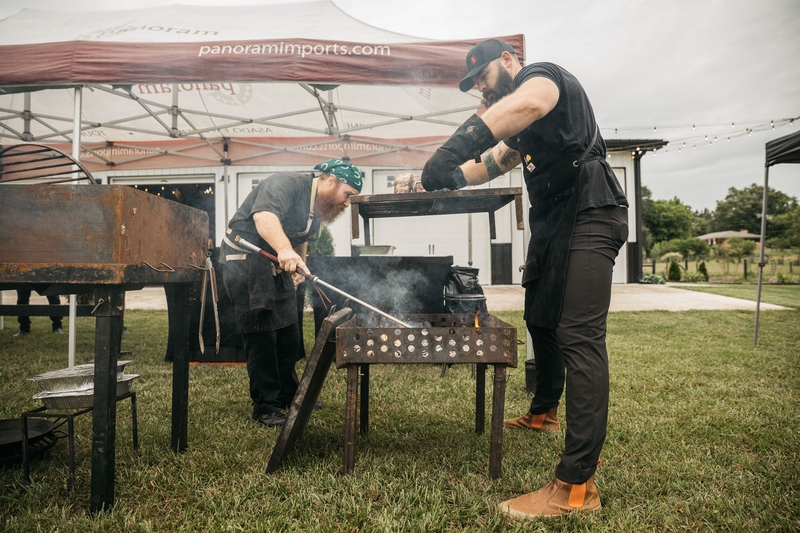
Hours before a recent wedding reception begins, the team arrives, sets up tents, the bar, grill after grill, using seasoned wood - some of it imported from Argentina - to light fires that burn with a primal invitation.
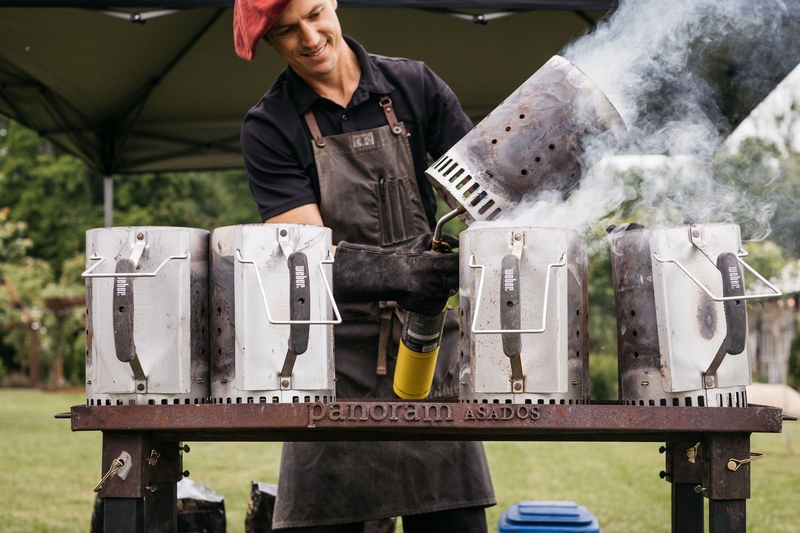
"Fire is something in its form, its already tantalizing. Fire draws people in, draws people together," he said.
"You show love when cooking for people. I like to do that with fire."
There is irony: to create such a slow-paced event, the team keeps a sharp clock; the attention to detail broken down to the minute - the knives sharpened, cheese empanadas prepared, vegetables cut, flatware polished, skirt steak laid on the searing grill.
"The smoke gives flavor a new meaning when you have a piece of meat like picaña that has a big fat cap on it and it drips into the fire little by little, and as that specific grease drips, it creates specific smoke and from that, specific flavors are absorbed into the whole piece of meat in a way you don't get over your grates in a restaurant or with any other equipment," he said.
"Fire is something - it's fragile. You need to tend it. It can be very powerful if you don't know how to tame it."
There are ribeyes.
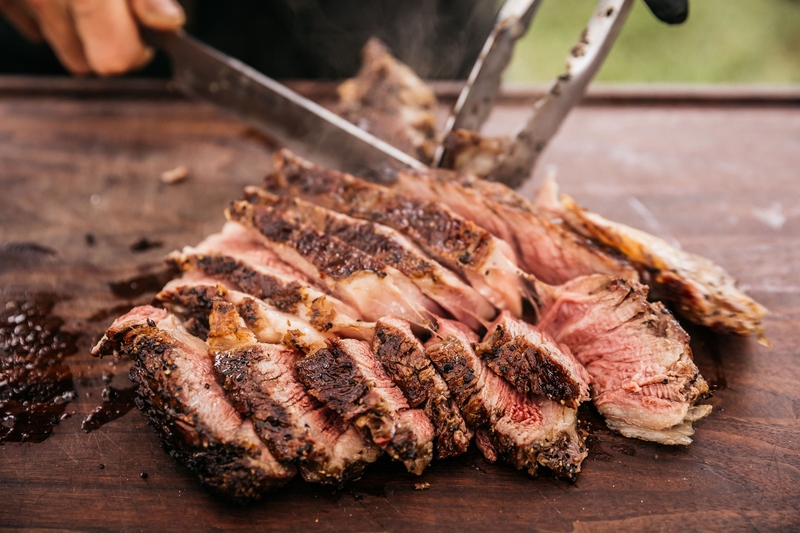
And picañas and tomahawks.
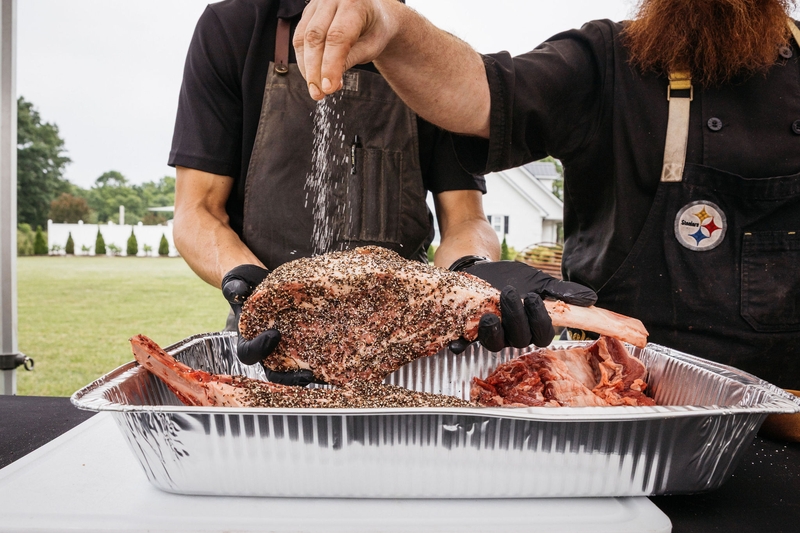
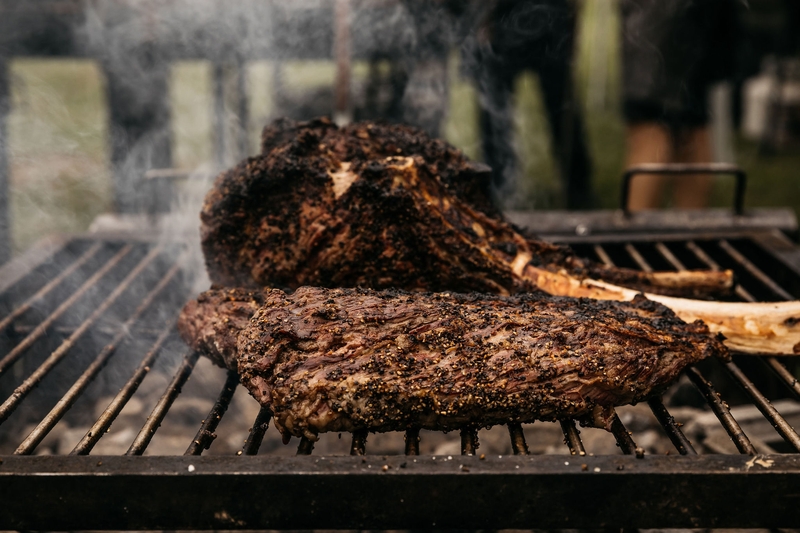
And spinalis, or ribeye cap.
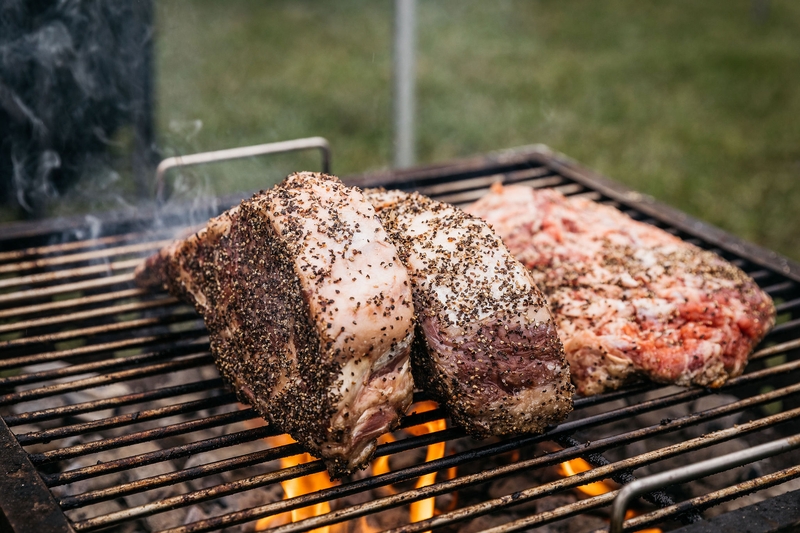
And chorizos.

And salmon over copper mats.
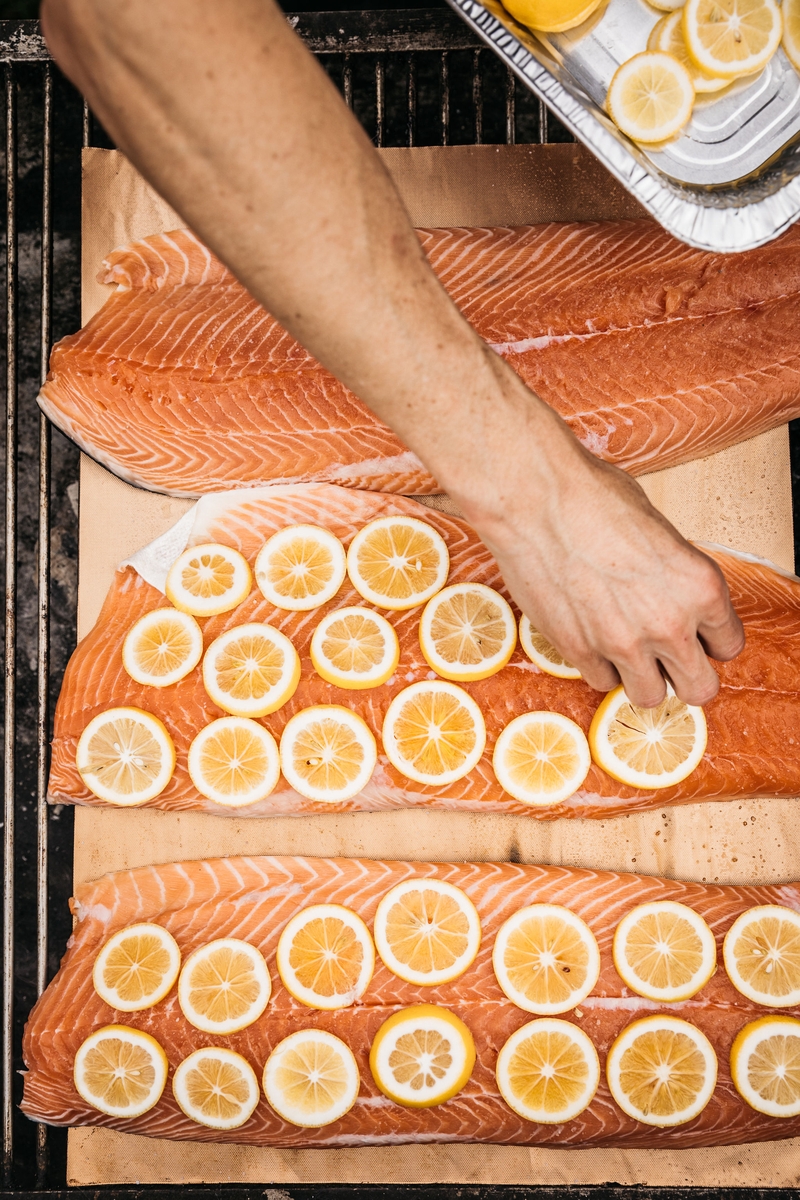
Sometimes laid flat. Sometimes nailed to wooden planks.
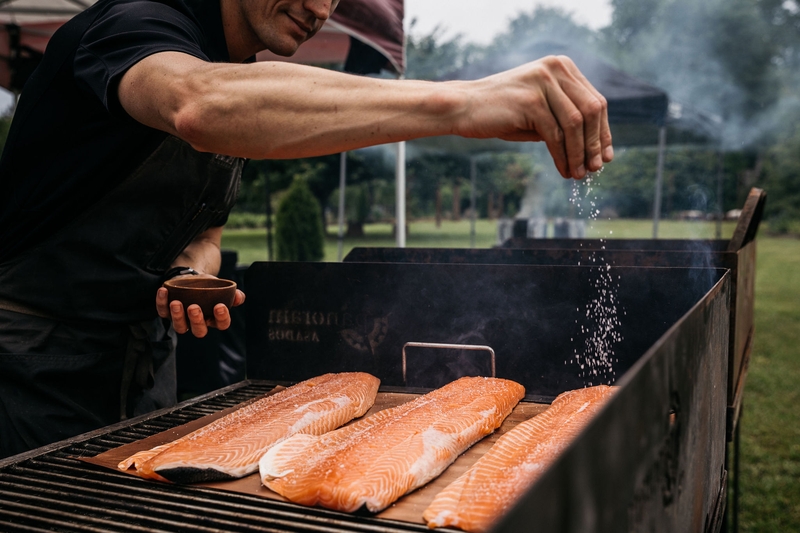
Handmade pillows of cheese empanadas.
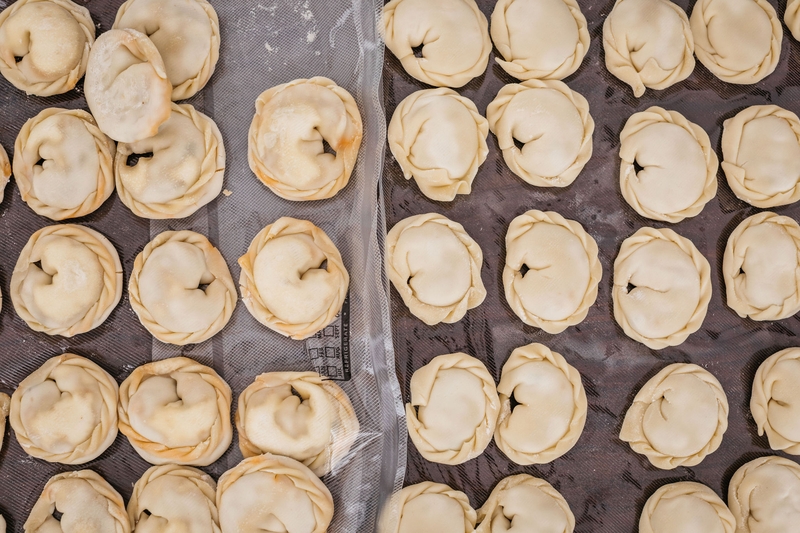
And shishito peppers.
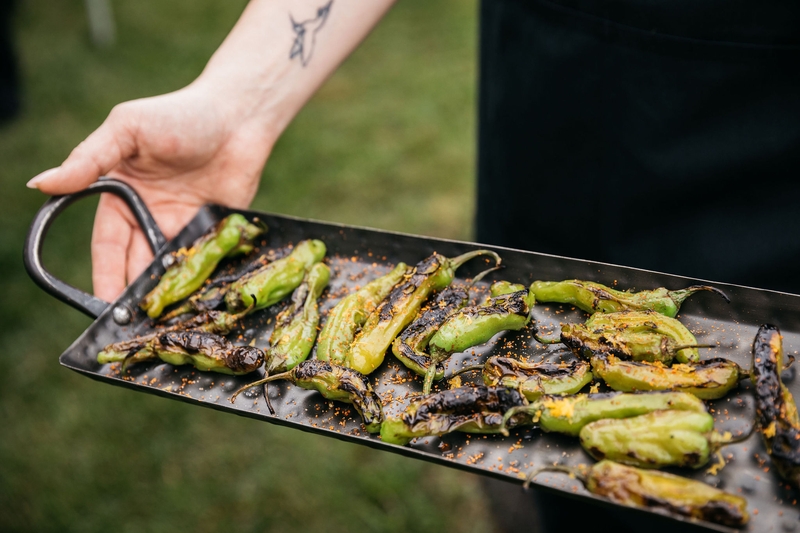
All of it served on wooden plates, a tradition in Argentina.
"The wood keeps things warm a little longer," said Mariano.
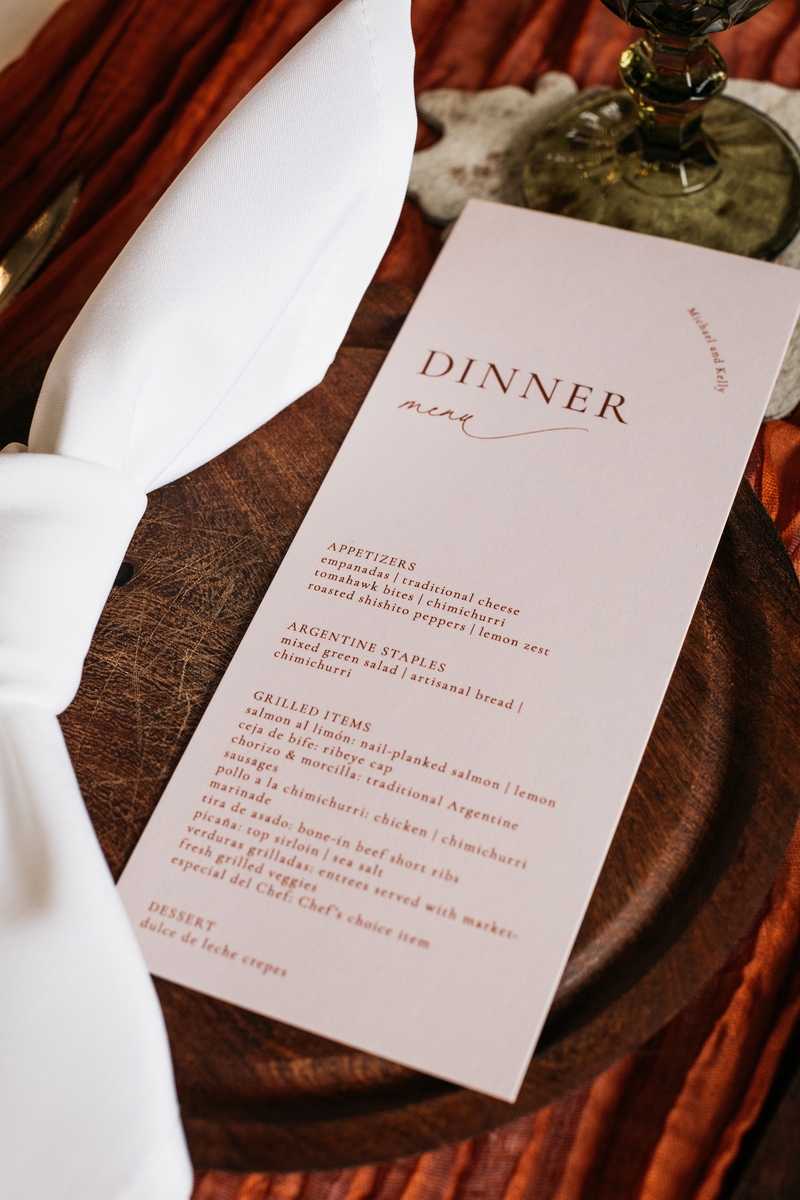
During a recent wedding, the bride and groom snapped photos under the cherry tree and garden as the best men snapped iPhone photos of the fires.
Mariano uses a short-handled shovel, scooping and stirring coals. How hot will the fire get?
"Like you can hold your hands out, six, seven, eight seconds," he said.
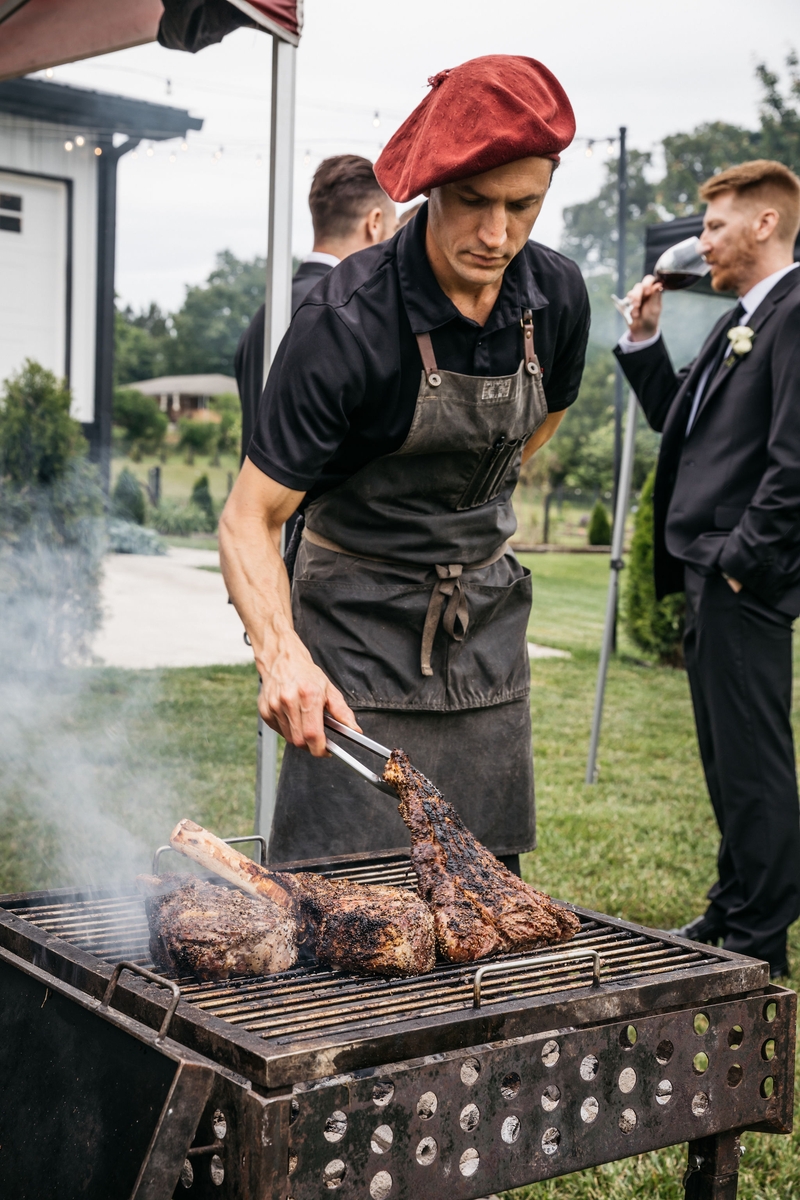
Later, once the fires have burnt out, the plates cleaned and party over, Mariano - the former tennis star - will speak of a new form of success.
"Other people finding joy in the experience we provide? That's it. I'm winning. I'm winning in life. I'm doing what I love," he said.
"Yes, it's a lot of work. I do it for the love of it."
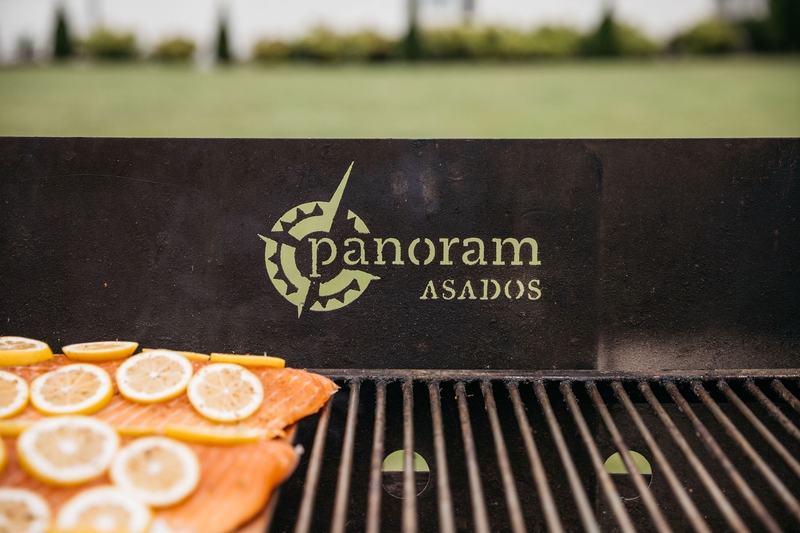
In 1973, the economist EF Schumacher wrote, now famously, in defense of appropriate size, claiming that small was beautiful.
"I have no doubt that it is possible to give a new direction to technological development, a direction that shall lead it back to the real needs of man, and that also means: to the actual size of man. Man is small, and, therefore, small is beautiful. To go for giantism is to go for self-destruction," he said.
We forget the needs of humans are quite small.
Drawn far from the shore, we labor and toil, trying to reach a size and scale that end up being disproportionate, seduced by forces - the giants - that do not always have our best interests at heart.
The asado brings us back to size, situating us before the things that puzzle-piece fit correctly into our hearts: food, fire, drinks, the table of human fellowship.
The asado reminds us of the small things. The beautiful things.
We do not live by bread alone.
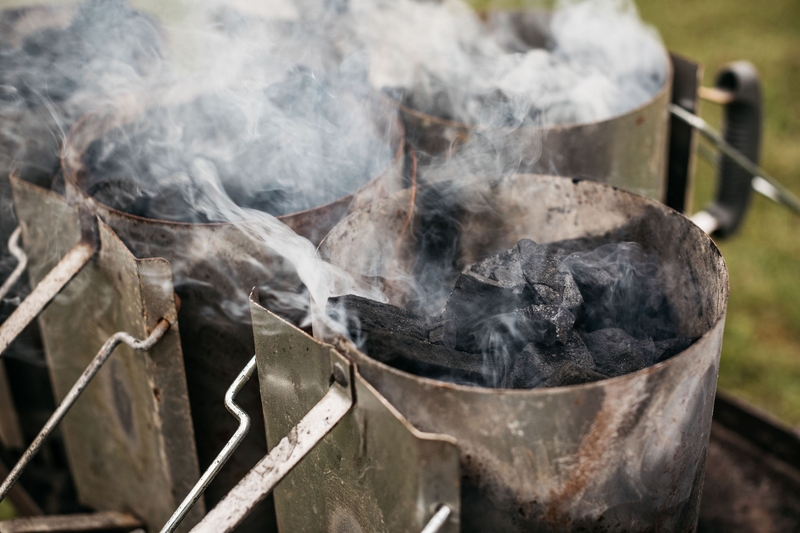
"The word asado. Like many other nouns, I want to create it as a verb," Mariano said.
"When everything comes together, it is so special. It becomes a verb, a tense in time, a way of life."
You do not have to hire Panoram Asados to encounter this.
Asado can be found right here, right now. The inhale/exhale of gratitude before your first bite? Asado. The sourdough starter you've nurtured for years? Asado. The backyard tomatoes you share with your neighbor? Taking time to smell them even before you pick them? Asado.
Years ago, the first fires were lit in a young Mariano, then, Angelina.
The same fires can be lit in us.
"Asado as a verb," Mariano said. "Let's asado together."
"No passport required," said Angelina.
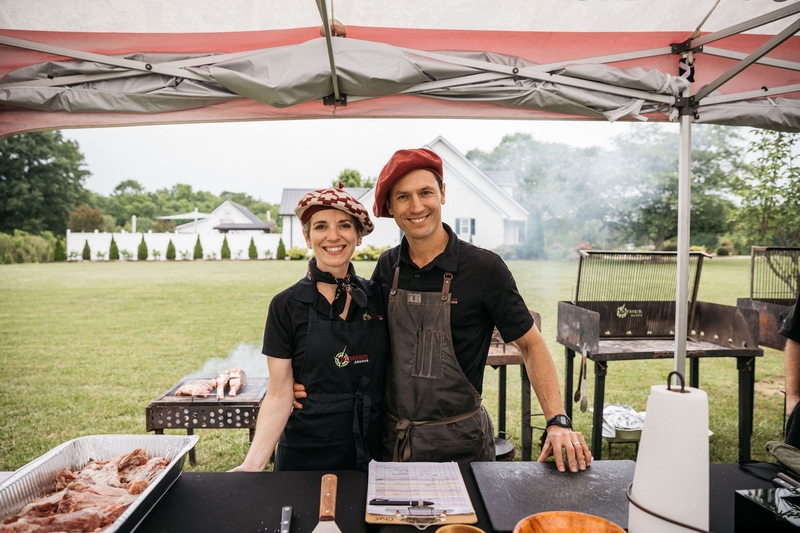
Story ideas, questions, feedback? Interested in partnering with us? Email: david@foodasaverb.com
This story is 100% human generated; no AI chatbot was used in the creation of this content.
The fires were first lit years ago.
It is Sunday morning in Salta, Argentina, near the foothills of the Andes Mountains, three decades ago.
Through the open windows, there is the smell of wood smoke, faint at first. There is birdsong, a woman humming to folk music in the kitchen, boiling potatoes. Her husband is outside, salting meats and sipping the day's first birra near the mud oven which contracts and expands, as if breathing. Upstairs, the rustling of a teenager waking.
His name is Mariano Cebrián.
It is the morning of his family's asado.
He helps his father light the fires, chopping up old produce boxes for kindling. The first neighbors stroll up, carrying fruit salad, red wine; uncles, aunts, cousins arrive, more birras are popped, early conversations - football and politics - are easy, soon to grow animated and expansive.

One hour goes by, then two. No one rushes. The long table is then set with wooden plates as the courses arrive: choripan, chicken, then sweet breads, skirt steak, short ribs. The beer turns to wine, early afternoon to evening, the sobremesa - the contentment, the ease - going on for hours.
Young Mariano watches his father preside over it all, hugging, telling stories, attention generously spread wide but also focused, like all good hosts.
Bodies relax. This is asado.
Asado is both a way of cooking - meat prepared over fire - and an experience. For Argentinians, it is also tradition: the long gathering around a shared table.
Years later, Mariano will always remember these moments. No matter where he goes in the world - Georgia College & State University, the Hamptons, Chattanooga - the asado comes with him. The heart won't ever forget.
Camping with friends, he'll light the fire, cooking and preparing the food.

Moving to Chattanooga, he builds grills and ovens in his backyard.
Falling in love with Angelina - they met in college - he invites her back to Argentina, for her first asado.
There, she saw the long table, felt the hours of ease.
"I felt like I was in a movie," she said. "It was like Anthony Bourdain was going to pop out."
It is asado.
"Asado is a feeling. An experience," said Mariano. "Time for us to slow down and have time for each other."
"It is like a fairy tale."

In 2017, Mariano and Angelina created Panoram Asados, a catering company that recreates the asado experience.
Long tables. Hours together. Multiple courses, centered around meat and vegetables cooked over open fires.
"It is slow and we take our time. Eating, little by little," he said. "That slowing down? When you are at a table with food, you engage more, you forget about time."


Yet, calling Panoram Asados a catering company is a bit like calling Circe de Soleil a circus.
Yes, they cater.
But the experience is far more than that.
"We build an Argentine restaurant in your backyard," said Angelina.

For families and friends, parties and weddings and events, Mariano and Angelina recreate the asado experience: grills forged by hand and open fires, natural lump charcoal, long tables holding multiple courses of meat and vegetables, served at an even pace to encourage rest, connection and communion.
Their menu is vast, yet centered around one truth: everything in its right place. Food cooked over fire, served at an even pace, stretching out the evening to make room for all the things we crave: the sharing of food and ourselves around a table.
"What we do is try to get people to experience food and culture and truly slow down," he said.
"The asado is something that will create memories beyond the food."

Some 20 years ago, Mariano left Argentina for Georgia College & State University; he played college tennis, with summers coaching in the Hamptons. An MBA followed, then he and Angelina moved to Chattanooga, traveling back to the Hamptons every summer.
"Chattanooga was the closest to Salta that I'd ever seen," he said. "In terms of terrain and mountains and people and sense of community. We both fell in love with it."
He had been informally recreating asados for friends and families for years here. Then, someone said: we'll pay you to do this.
To launch Panoram Asados, Angelina - it felt like a movie - left a career in corporate marketing to partner with Mariano. She calls it "experiential dining."
Today, they spend summers offering asados in the Hamptons, then back to Chattanooga for events in the fall-winter-spring.

Why is it often hard to find that asado ease? In our treadmill/busy culture, it often feels out-of-reach, a mirage we can't quite make real.
"Here, it's almost like people rely on a good buzz and for 'Sweet Caroline' to come on to give themselves permission to loosen up and relax," Angelina said, smiling.
So, Panoram Asados offers a taste of a genuine asado.
"It's dinner and a show," she said. "We're doing all open fire cooking in front of you."
For other members of the team, it was love at first sight.
"I came to one of these events," said Stewart Howorth.
By the end of the night, he'd walked up to Mariano, hand outstretched, with one question:
"How can I get involved?"

Hours before a recent wedding reception begins, the team arrives, sets up tents, the bar, grill after grill, using seasoned wood - some of it imported from Argentina - to light fires that burn with a primal invitation.

"Fire is something in its form, its already tantalizing. Fire draws people in, draws people together," he said.
"You show love when cooking for people. I like to do that with fire."
There is irony: to create such a slow-paced event, the team keeps a sharp clock; the attention to detail broken down to the minute - the knives sharpened, cheese empanadas prepared, vegetables cut, flatware polished, skirt steak laid on the searing grill.
"The smoke gives flavor a new meaning when you have a piece of meat like picaña that has a big fat cap on it and it drips into the fire little by little, and as that specific grease drips, it creates specific smoke and from that, specific flavors are absorbed into the whole piece of meat in a way you don't get over your grates in a restaurant or with any other equipment," he said.
"Fire is something - it's fragile. You need to tend it. It can be very powerful if you don't know how to tame it."
There are ribeyes.

And picañas and tomahawks.


And spinalis, or ribeye cap.

And chorizos.

And salmon over copper mats.

Sometimes laid flat. Sometimes nailed to wooden planks.

Handmade pillows of cheese empanadas.

And shishito peppers.

All of it served on wooden plates, a tradition in Argentina.
"The wood keeps things warm a little longer," said Mariano.

During a recent wedding, the bride and groom snapped photos under the cherry tree and garden as the best men snapped iPhone photos of the fires.
Mariano uses a short-handled shovel, scooping and stirring coals. How hot will the fire get?
"Like you can hold your hands out, six, seven, eight seconds," he said.

Later, once the fires have burnt out, the plates cleaned and party over, Mariano - the former tennis star - will speak of a new form of success.
"Other people finding joy in the experience we provide? That's it. I'm winning. I'm winning in life. I'm doing what I love," he said.
"Yes, it's a lot of work. I do it for the love of it."

In 1973, the economist EF Schumacher wrote, now famously, in defense of appropriate size, claiming that small was beautiful.
"I have no doubt that it is possible to give a new direction to technological development, a direction that shall lead it back to the real needs of man, and that also means: to the actual size of man. Man is small, and, therefore, small is beautiful. To go for giantism is to go for self-destruction," he said.
We forget the needs of humans are quite small.
Drawn far from the shore, we labor and toil, trying to reach a size and scale that end up being disproportionate, seduced by forces - the giants - that do not always have our best interests at heart.
The asado brings us back to size, situating us before the things that puzzle-piece fit correctly into our hearts: food, fire, drinks, the table of human fellowship.
The asado reminds us of the small things. The beautiful things.
We do not live by bread alone.

"The word asado. Like many other nouns, I want to create it as a verb," Mariano said.
"When everything comes together, it is so special. It becomes a verb, a tense in time, a way of life."
You do not have to hire Panoram Asados to encounter this.
Asado can be found right here, right now. The inhale/exhale of gratitude before your first bite? Asado. The sourdough starter you've nurtured for years? Asado. The backyard tomatoes you share with your neighbor? Taking time to smell them even before you pick them? Asado.
Years ago, the first fires were lit in a young Mariano, then, Angelina.
The same fires can be lit in us.
"Asado as a verb," Mariano said. "Let's asado together."
"No passport required," said Angelina.

Story ideas, questions, feedback? Interested in partnering with us? Email: david@foodasaverb.com
This story is 100% human generated; no AI chatbot was used in the creation of this content.


















